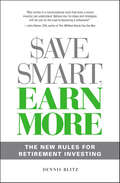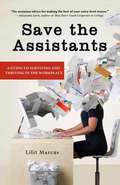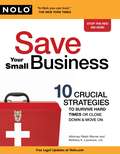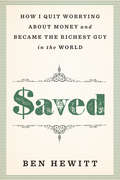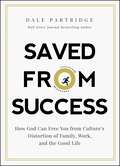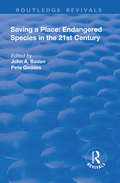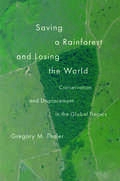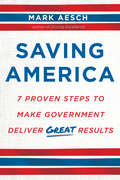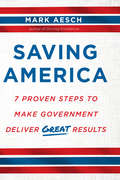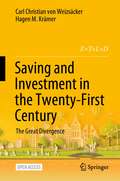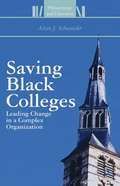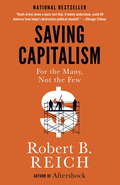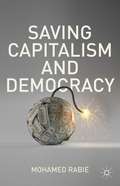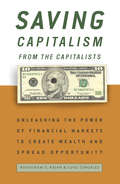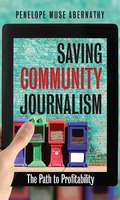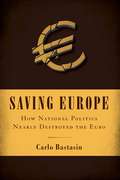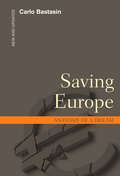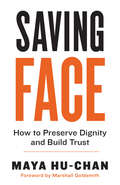- Table View
- List View
Save Smart, Earn More: The New Rules for Retirement Investing
by Dennis BlitzBlitz writes in a conversational style that even a novice investor can understand. Believe me, his ideas and strategies will set you on the road to becoming a millionaire!"-John Slatter, CFA, author of The 100 Best Stocks You Can Buy. If you're one of America's 78 million baby boomers, you've seen the Doomsday headlines, warning you that you're not saving enough to retire. Are you really headed for poverty in your retirement? Expert author Dennis Blitz says no. You may be saving enough-but you may not be saving smart enough. But you don't have to scrimp and sacrifice to save more. Instead, you need to know the most effective ways to get a better return on your investment-what really counts in wealth creation. From this book you will learn: The Nine Rules of Smart Investors; A theory to help investors measure risk; The right way to diversify; How to determine a good value stock. With the help of Save Smart, Earn More, you can retire in comfort and security-no matter what your current financial situation.
Save the Assistants: A Guide to Surviving and Thriving in the Workplace
by Lilit Marcus"If you're tired, you're poor, and you're a huddled mass of an assistant yearning to breathe free, look no further than Save the Assistants." --Yahoo!"Lilit at Save the Assistants . . . feels your pain." --Marie ClaireWhat happens when nine-to-five turns into nine-to-eleven? How do you outmaneuver the office Underminer? Is it appropriate to have a cocktail at a company lunch? How do you get reservations for a restaurant with an unlisted phone number? What do you do when your boss throws a stapler at your head?As Page Six Magazine recently noted, bosses are "going from mean to monstrous--and making The Devil Wears Prada look like a love story." What's an office drone to do? Call on Save the Assistants, the addictive and insightful guide to workplace sanity by Lilit Marcus, renowned assistant expert.On your first day at work, you learned how to answer the phone and turn on the computer. But four years of college hardly prepared you for the coffee-fetching, back-stabbing, and you-should-have-done-it-yesterdays of office life. Save the Assistants is here to help you not only survive your job, but ultimately get the career you want.
Save the Bees!
by Mary Kosut Lisa Jean MooreGrappling with the strange phenomenon of colony collapse disorder--the baffling disappearance of all bees from a hive that is often blamed for the honeybee's increasingly endangered status--New York City's hobbyist beekeeping communities have gone green. Lisa Jean Moore and Mary Kosut introduce beekeepers of all stripes: the careful cultivators of 'scientific' beekeeping groups, the passionately political radical 'backwards' beekeepers who hope to return the species to its most natural state, and DIY-influenced 'hipster' beekeepers who share a holistic approach to lowering their environmental impact. Though their approaches may differ, these beekeepers agree on one thing: to save the bee is to save our planet.
Save Your Small Business
by Ralph Warner AttorneyStay in business even through tough times with these simple, quick steps to small business survival. Small businesses are vulnerable in tough economic times. Undercapitalized and with little experience coping with the legal and practical issues that come up during recession, many businesses fail as their profit margins drop and clients pay late -- if at all. Save Your Small Business, written by a business owner who has survived three decades of challenges and economic downturns, provides 10 no-nonsense strategies designed to protect your personal assets from creditors and survive the current recession. You'll get practical advice to tackle such concerns as: Can my business be saved? Which are the most immediate and effective cuts I should make? How do I pay bills, negotiate debts -- and still make sure everyone in my office is paid on time? How can I creatively and effectively market my business on the cheap? How can I sell high-margin goods or services to get back in the black? How do I make sure my personal assets aren't vulnerable to my business' creditors? In these tough times of falling demand, impatient creditors, tight credit, and fierce competition, staying in the black is a constant battle, requiring smart moves and decisiveness under pressure. Save Your Small Business shows you how to weather the economic storm, including how to proceed when going out of business is inevitable.
Saved: How I quit worrying about money and became the richest guy in the world
by Ben HewittWhen Ben Hewitt met Erik Gillard, he was amazed. Here was a real-life rebel living happily and comfortably in small-town Vermont on less than $10,000 per year. Gillard's no bum. He has a job, a girlfriend, good friends, and strong ties to the community. But how he lives his life—and why—launches Hewitt on a quest to understand the true role of money and mindless consumerism in our lives. By meeting and befriending people like Erik Gillard, Hewitt realized that their happiness was real. What was he—and the rest of a deeply unhappy population—missing?Saved is the humorous, surprising, and ultimately life-changing result of Hewitt's quest, a narrative that challenges everything we know about the meaning of money. Hewitt uses his sharp eye for story, exhaustive reporting, and his own experience living below his means to bring what he learned into an even larger context. How does money really work? How can a bankrupt society move forward? The answers are not what you think, and Hewitt has written an important book for our times.
Saved from Success: How God Can Free You from Culture’s Distortion of Family, Work, and the Good Life
by Dale PartridgeWhat if the world's view of success is God's definition of failure? What if your beliefs about marriage, children, career, or money aren't based on God's values, but on those of a broken culture? When Dale Partridge's outwardly perfect life, marriage, and family were crumbling on the inside, he began questioning if culture's definition of success was something to seek after or be saved from. What he found challenged everything he believed about "the good life" and equipped him to rebuild an even better life based on God's timeless design. Filled with scripture and practical application, Saved from Success is the book millions of burned-out and bedraggled Christians have been waiting for.
Saving a Place: Endangered Species in the 21st Century
by John A. Baden Pete GeddesThis title was first published in 2000: The noble goals embodied in the Endangered Species Act are colliding with financial and social realities. Citizens increasingly face the costs of current policies, while initiatives which fail to respect liberty and property meet serious resistance at every turn. Despite widespread verbal support for saving species ’at any cost’, when trade-offs become obvious, and values compete, support for these policies evaporates. This edited collection examines ethically and materially responsible approaches to this problem, written by leading international figures from a variety of disciplines. The result is the most comprehensive and constructive analysis of the effectiveness and viability of endangered species protection available.
Saving a Rainforest and Losing the World: Conservation and Displacement in the Global Tropics (Yale Agrarian Studies Series)
by Gregory M. ThalerAn unflinching investigation of the false promises of land sparing, exposing how its illusory successes mask the failures of green capitalism For two decades, the concept of land sparing, the claim that agricultural intensification can spare land by preventing forest clearing for agricultural expansion, has dominated tropical forest conservation. Land sparing policies transform landscapes and livelihoods with the promise of reconciling agricultural development with environmental conservation. But that land sparing promise is false. Based on six years of research on agrarian frontiers in Indonesia, Brazil, and Bolivia, this book traces where and how land sparing becomes policy and charts the social and ecological effects of these political contests. Gregory M. Thaler explains why land sparing appears successful in some places but not in others and reveals that success as an illusion achieved by displacing deforestation to new frontiers. The failure of land sparing exposes a harsh truth behind assurances of green capitalism: capitalist development is ecocide.
Saving Alma Mater: A Rescue Plan for America's Public Universities
by James C. GarlandAmerica's public universities educate 80% of our nation's college students. But in the wake of rising demands on state treasuries, changing demographics, growing income inequality, and legislative indifference, many of these institutions have fallen into decline. Tuition costs have skyrocketed, class sizes have gone up, the number of courses offered has gone down, and the overall quality of education has decreased significantly.Here James C. Garland draws on more than thirty years of experience as a professor, administrator, and university president to argue that a new compact between state government and public universities is needed to make these schools more affordable and financially secure. Saving Alma Mater challenges a change-resistant culture in academia that places too low a premium on efficiency and productivity. Seeing a crisis of campus leadership, Garland takes state legislators to task for perpetuating the decay of their public university systems and calls for reforms in the way university presidents and governing boards are selected. He concludes that the era is long past when state appropriations can enable public universities to keep their fees low and affordable. Saving Alma Mater thus calls for the partial deregulation of public universities and a phase-out of their state appropriations. Garland's plan would tie university revenues to their performance and exploit the competitive pressures of the academic marketplace to control costs, rein in tuition, and make schools more responsive to student needs.A much-needed blueprint for reform based on Garland's real-life successes as the head of Miami University of Ohio, Saving Alma Mater will be essential for anyone concerned with the costs and quality of higher education in America today.
Saving America: 7 Proven Steps to Make Government Deliver Great Results
by Mark AeschNational polling indicates that, for the first time in American history, people believe their children will not be as well off as they are. Even more alarming, is that many Americans believe the biggest problem facing our nation today is government itself. The public sector receives trillions of taxpayer dollars every year, and yet because of its inability to operate effectively, government fails to deliver the quality of service we are paying for. It is clear the American people are weary of paying Ritz Carlton-level taxes for Bates Motel-quality government. In Saving America, Mark Aesch tells us where government--at the local, state, and federal level--is falling short and offers a coherent, non-partisan, seven-step plan for rebuilding our nation's public agencies. The book is not a political broadside nor is it theoretical; instead, it's an inspirational and instructional framework that will help citizens, elected officials, and public administrators make American government great--and provide taxpayers with real value. The 7 Steps to Success will lead to measurable gains for organizations large and small, including school systems, municipal governments, entire states, and even the federal government itself, producing real results for taxpayers and consumers.
Saving America: 7 Proven Steps to Make Government Deliver Great Results
by Mark AeschNational polling indicates that for the first time in American history, people believe their children will not be as well off as they are. The primary reason for this? The lack of performance by government. The public sector receives trillions of American taxpayer dollars every year and yet because of its seeming inability to run effectively, government is not delivering the level of service the people are paying for. In Saving America, Mark Aesch tells us where government -- at the local, state, and federal level -- is falling short and offers a coherent, non-partisan, Seven-Step plan for rebuilding our nation's public agencies. The book is not a political broadside or a theoretical academic tract; it's an accessible guidebook that helps local citizens, elected officials, and administrators make American government great again. The Seven Steps process will lead to measurable gains for organizations large and small, including school systems, municipal governments, entire states, and even the federal government itself.
Saving America: Faith-Based Services and the Future of Civil Society
by Robert WuthnowThe author discusses whether congregations are effective vehicles for providing broad-based social programs and whether they are actually fostering the civil society.
Saving and Investment in the Twenty-First Century: The Great Divergence
by Carl Christian von Weizsäcker Hagen M. KrämerThe economy of the 21st century in the OECD countries and in China, is characterized by a new phenomenon: the structural surplus of private savings in relation to private investment. This is true even in a situation of prosperity and very low interest rates. On the one hand, this excess saving is due to people's increasing inclination to save in light of rising life expectancy, driven by the desire to have sufficient assets in old age. On the other hand, the demand for capital is not increasing to the same extent, so that investment is not keeping pace with the rising desire to save. The resulting gap between the private desire for wealth and private investment can only be closed by increasing public debt. This open access book offers a new, capital-theoretical perspective on the macroeconomic relationship between desired wealth and investment, and it presents new empirical data on private wealth and its composition in the OECD plus China area. The authors argue that a free economic and social order can only be stabilized if the wealth aspirations of individuals are met under conditions of price stability. This is not possible without substantial net public debt. A new way of thinking about the economy as a whole is required. By way of an in-depth theoretical and empirical analysis, the book demonstrates this new way of thinking and describes the current challenges facing economic policy. It will appeal to economists and students of economics who are interested in macroeconomic theory and its economic policy implications.An impressive, and convincing theoretical dive into the fundamentals behind secular stagnation, with very strong implications for actual debt policy. Public debt may be needed to improve welfare.- Olivier Blanchard, Senior Fellow at the Peterson Institute for International Economics and Professor of Economics Emeritus at Massachusetts Institute of Technology (MIT). Chief Economist at the International Monetary Fund from 2008 to 2015. Saving and Investment in the Twenty-First Century gives a wholly new perspective on macroeconomics. (...) Weizsäcker and Krämer describe a simple, practical solution to the underemployment that has plagued Southern Europe for more than a decade.- George Akerlof, Nobel Laureate in Economics, 2001. Professor at the McCourt School of Public Policy at Georgetown University and Professor of Economics Emeritus at the University of California, Berkeley. This is a profound and original contribution that can help us to understand and act on the great issues of our times.- Nicholas Stern, Grantham Research Institute on Climate Change and the Environment at the London School of Economics. Author of the Stern Review Report on the Economics of Climate Change. Chief Economist at the World Bank from 2000 to 2003.
Saving Behavior and the Asset Price "Bubble" in Japan
by Guy Meredith Ulrich BaumgartnerA report from the International Monetary Fund.
Saving Black Colleges
by Alvin J. SchexniderSaving Black Colleges makes clear the challenges, opportunities, and prospects for change historically black colleges and universities now face. Schexnider, the former chancellor of Winston-Salem State University, details what he could and could not accomplish, examines how these issues affect other HBCUs, and outlines a practical way forward. Alvin J. Schexnider is the president of Schexnider & Associates, LLC. He previously served as the president of Thomas Nelson Community College and as the executive vice president and interim president of Norfolk State University.
Saving Capitalism: For The Many, Not The Few
by Robert B. ReichFrom the author of Aftershock and The Work of Nations, his most important book to date--a myth-shattering breakdown of how the economic system that helped make America so strong is now failing us, and what it will take to fix it. Perhaps no one is better acquainted with the intersection of economics and politics than Robert B. Reich, and now he reveals how power and influence have created a new American oligarchy, a shrinking middle class, and the greatest income inequality and wealth disparity in eighty years. He makes clear how centrally problematic our veneration of the "free market" is, and how it has masked the power of moneyed interests to tilt the market to their benefit. Reich exposes the falsehoods that have been bolstered by the corruption of our democracy by huge corporations and the revolving door between Washington and Wall Street: that all workers are paid what they're "worth," that a higher minimum wage equals fewer jobs, and that corporations must serve shareholders before employees. He shows that the critical choices ahead are not about the size of government but about who government is for: that we must choose not between a free market and "big" government but between a market organized for broadly based prosperity and one designed to deliver the most gains to the top. Ever the pragmatist, ever the optimist, Reich sees hope for reversing our slide toward inequality and diminished opportunity when we shore up the countervailing power of everyone else. Passionate yet practical, sweeping yet exactingly argued, Saving Capitalism is a revelatory indictment of our economic status quo and an empowering call to civic action.From the Hardcover edition.
Saving Capitalism and Democracy
by Mohamed RabieSaving Capitalism and Democracy tries to answer the difficult questions posed by intellectuals, the media, politicians, students and ordinary people concerning the crisis and how to avert an impending catastrophe.
Saving Capitalism from the Capitalists: Unleashing the Power of Financial Markets to Create Wealth and Spread Opportunity
by Raghuram G. Rajan Luigi ZingalesAnalysis of our Economy during the past century.
Saving Capitalism from the Capitalists
by Raghuram G. Rajan Luigi ZingalesIn the wake of recent business scandals, financial markets are often thought of as parasitic institutions that feed off the blood, sweat, and tears of human endeavor. This guide shows that such markets in fact supply the fuel of a vital economy.
Saving Community Journalism
by Penelope Muse AbernathyAmerica's community newspapers have entered an age of disruption. Towns and cities continue to need the journalism and advertising so essential to nurturing local identity and connection among citizens. But as the business of newspaper publishing collides with the digital revolution, and as technology redefines consumer habits and the very notion of community, how can newspapers survive and thrive? In Saving Community Journalism, veteran media executive Penelope Muse Abernathy draws on cutting-edge research and analysis to reveal pathways to transformation and long-term profitability. Offering practical guidance for editors and publishers, Abernathy shows how newspapers can build community online and identify new opportunities to generate revenue. Examining experiences at a wide variety of community papers--from a 7,000-circulation weekly in West Virginia to a 50,000-circulation daily in California and a 150,000-circulation Spanish-language weekly in the heart of Chicago--Saving Community Journalism is designed to help journalists and media-industry managers create and implement new strategies that will allow them to prosper in the twenty-first century. Abernathy's findings will interest everyone with a stake in the health and survival of local media.
Saving Disney
by Aaron M.G. Zimmerman Nancy Dean BeaulieuAt a March 2004 annual shareholder meeting, 45% of Walt Disney Co.'s shareholders withheld their support from CEO and Chairman Michael Eisner, producing a large no-confidence vote in the company's leader. The company had struggled financially in recent years and the board was widely believed to be beholden to Eisner. Two directors, Roy Disney and Stan Gold, resigned in protest of Eisner's leadership and the board's unwillingness to change. The two began to wage a PR battle calling for Eisner's removal and asking all shareholders to withhold their support from him at the upcoming shareholder meeting. Traces the history of Eisner's reign at the company and the events leading up to the March 3, 2004, shareholders meeting.
Saving Europe
by Carlo BastasinThree times in the few years since the global financial crisis erupted, the euro has come close to extinction, endangering both the world economy and history's most ambitious project in shared sovereignty. Yet each time, the case for a common currency proved to be more compelling than its weaknesses, and the euro survived. Saving Europe reveals how the nexus of international economics and national politics pushed monetary union to the brink of a breakup, how that disastrous development was avoided, and why the long-term viability of a common currency challenges politics as we know it.Carlo Bastasin reveals and analyzes what has been happening behind the scenes in European negotiations since the financial crisis began with the collapse of major financial institutions in 2008. He argues that the crisis in the euro zone actually has a political origin, having emerged from the self-interested abuses of national politics. Moreover, the crisis is reinforced even now by the obstinate defense of national prerogatives in politics and finance as well as by the lack of commitment for shared or supranational sovereignty. While the prevalent view is that monetary union was a flawed project from the start and is in need of amending, Bastasin shows that the failures have to do almost entirely with national opportunism-not only in Greece but in most countries, including Germany-and concludes that the crisis will lead to Europe's political union.Bastasin's work is an engrossing historical chronicle, interweaving moments of high drama with individual personalities on the world stage. German ChancellorAngela Merkel, French President Nicolas Sarkozy, and national and European central bankers, among others, play key roles. Saving Europe is also a rigorous attempt to make larger sense of what has happened in the euro zone and what might happen next. Given the central importance of Europe within the fragile world economy as well as growing speculation that the euro might disappear, this is essential reading for anyone trying to grasp international economics and politics. Just as important, it is a compelling tale of people, personalities, power, and money. There is no other book like it.
Saving Europe
by Carlo BastasinIn this gripping narrative, Carlo Bastasin reconstructs the main political decisions of the euro crisis, unveiling the hidden interests and the secret diplomacy behind the scene. The European dream was both the rejection of war and the creation of a new spirit of peaceful cooperation. Yet confrontation has been the hallmark of the euro crisis, and national opportunistic gimmicks have driven the awkward attempts to solve the crisis itself. Today, Europe is in a crisis of democracy, which Bastasin has dubbed, "the first War of Interdependence of the global age." Praise for the first edition of Saving Europe Bastasin does an admirable job in analysing the euro-zone's economic challenges and is a sure-footed guide through the seemingly endless European Union summit meetings that were supposed to resolve them. He also has an eye for the human detail that makes his sad account of institutional muddle surprisingly compelling. - Financial TimesBastasin's book is worth reading for its detailed political narrative of the eurozone crisis to date, focusing on the interaction among decision-makers in Europe's capitals. - Foreign AffairsA reconstruction that may be considered definitive. Revelations on the European negotiations are written with talent and go hand in hand with no-esoteric economic analysis and with the right amount of realism to reach the political substance. -Corriere della SeraAnyone looking for general knowledge and deeper understanding of the crisis, I can recommend a formidable analysis by Carlo Bastasin: Saving Europe. The author is a very unusual combination of a qualified economist and driven journalism. -Svenska Dagbladet
Saving Europe
by Carlo BastasinThree times in the few years since the global financial crisis erupted, the euro has come close to extinction, endangering both the world economy and history's most ambitious project in shared sovereignty. Yet each tim e, the case for a common currency proved to be more compelling than its weaknesses, and the euro survived. Saving Europe reveals how the nexus of international economics and national politics pushed monetary union to the brink of a breakup, how that disastrous development was avoided, and why the long-term viability of a common currency challenges politics as we know it.Carlo Bastasin reveals and analyzes what has been happening behind the scenes in European negotiations since the financial crisis began with the collapse of major financial institutions in 2008. He argues that the crisis in the euro zone actually has a political origin, having emerged from the self-interested abuses of national politics. Moreover, the crisis is reinforced even now by the obstinate defense of national prerogatives in politics and finance as well as by the lack of commitment for shared or supranational sovereignty. While the prevalent view is that monetary union was a flawed project from the start and is in need of amending, Bastasin shows that the failures have to do almost entirely with national opportunism--not only in Greece but in most countries, including Germany--and concludes that the crisis will lead to Europe's political union.Bastasin's work is an engrossing historical chronicle, interweaving moments of high drama with individual personalities on the world stage. German ChancellorAngela Merkel, French President Nicolas Sarkozy, and national and European central bankers, among others, play key roles. Saving Europe is also a rigorous attempt to make larger sense of what has happened in the euro zone and what might happen next. Given the central importance of Europe within the fragile world economy as well as growing speculation that the euro might disappear, this is essential reading for anyone trying to grasp international economics and politics. Just as important, it is a compelling tale of people, personalities, power, and money. There is no other book like it.
Saving Face: How to Preserve Dignity and Build Trust
by Maya Hu-ChanOrganizations now need to attract, retain, and motivate teams and employees across distance, time zones, and cultural differences. Building authentic and lasting human relations may be the most important calling for leaders in this century. According to management and global leadership specialist Maya Hu-Chan, the concept of "saving face" can help any leader preserve dignity and create more empathetic cross-cultural relationships. "Face" represents one's self-esteem, self-worth, identity, reputation, status, pride, and dignity. Saving face is often understood as saving someone from embarrassment, but it's also about developing an understanding of the background and motivations of others to discover the unique facets we all possess. Without that understanding, we risk causing others to lose face without even knowing it. Hu-Chan explains saving face through anecdotes and practical tools, such as her BUILD leadership model (Benevolence, Understanding, Interacting, Learning, and Delivery). This book illustrates how we can give face to create positive first impressions, avoid causing others to lose face, and, most importantly, build trust and lasting relationships inside and outside the workplace.
